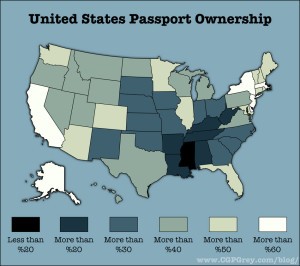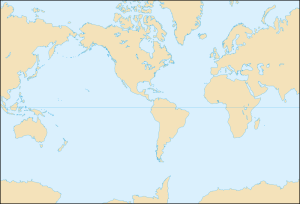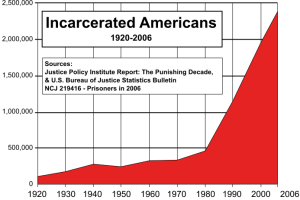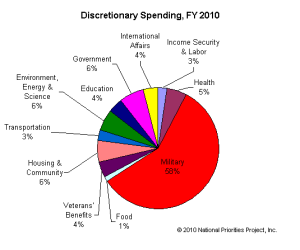‘Murica. The greatest country in the world, that ever was or will be. Right? Well, that’s what plenty of Americans think. Oddly enough, they’re often the ones who have no understanding of the world, inside American borders or out. Even the chauvinistic use of the term America is problematic to begin with, not to mention the endless flag-waving and vainglorious boasting as to our imagined greatness. We’re like a C+ jock calling himself the smartest kid in school.

Sadly, it turns out that a lot of what people say about the United States turns out to be quite accurate. Mediocrity has long been our station, and for quite some time, our laurels made for a great resting place. But it’s not the 1950s anymore. The rest of the world is catching up––scientifically, economically, educationally––and unless we make some major systemic changes to the way we do business, they’re going to leave us in the dust. In some cases, they already have. Thanks, CERN. You damn atom-smashing bastard.
So, do I hate America? No, far from it. But we have some obscene problems that our collective ego largely refuses to acknowledge, or that entrenched opposition refuses to change. We’re not #1 in any category worth winning, and a lot of the worst stereotypes about Americans are embarrassingly true.
It’s not an insult, guys. It’s a call to action. We’ve got 99 problems, and a solution to none.
Allow me to name just a few…
The unfortunate American stereotypes list:
1) We’re FAT

If there’s anywhere to start, it’s right here. Our expanding waistlines have been the subject of global ridicule for decades, with our weapons of mass consumption fed with bottomless obesity fuel, and our luxurious domestic throne rooms of TV appreciation and ever-present automobile infrastructure at the ready to remove any and all semblance of physical activity from our daily routine.
A couple fun facts: 68% of Americans were overweight or obese in 2012, and since 1960, we’ve packed on an extra 24 pounds each, causing endless problems related to diabetes, heart disease, fuel consumption, and airplane seating size standardization. Somehow that $60 billion we spend every year on weight loss products is getting us nowhere.
When I was in Taiwan, one of many nations for whom portion control and lack of trans-fats are simply non-issues, I was asked if I thought the humans in Wall-E were a realistic portent of our inevitable fate. They thought it was silly to think humans would end up as severely fat, immobilized, and digitally entertained as the characters depicted in the film…whereupon I informed them that a certain percentage of our population has already achieved such a feat.
Asia in general has significantly lower rates of obesity. Just for a quick comparison, our 33.8% obesity rate is pretty darn easily beaten by Japan’s 3.5%. Get it together, America.
Minor consolation? Someone overtook us. But our current 2nd place fat trophy is no reason to cheer. And I expect our size and sedentary vegetating often contribute to another particular sort of laziness…
2) We barely travel

We’ve all heard the embarrassingly low statistics concerning the percentage of Americans holding passports, but at this point, it’s over 30%. Still incredibly lame, and far behind the UK’s 80%, but a lot better than you may have heard.
But I think that misses the point. It doesn’t matter how many people have passports, but how many use them. And according to a (somewhat outdated) study that ranked countries according to number of trips abroad, the USA is in a respectable 3rd place. Woo hoo!
But that’s by sheer numbers, not per capita. Germany was #1, with 86.6 million trips abroad…compared to a population of 80 million. Compare that to the 58 million trips that Americans took abroad, and our 300 million people, and they turn out to be quintuple the travelers we are.
We’ve got all sorts of excuses, of course. We live far away. Our economy sucks. And we barely speak our own language, much less others.
And all that would make sense, except when you take a look at Canada, where a respectable 60% hold passports, and according to tourist receipt data from 2009, they spent about 1/3 as much as (USA) Americans did on travel, but with only 1/10 the population, which makes them approximately triple the travel junkies we are. And both are in North America, so I don’t think problems like expensive plane tickets are good enough excuses.
A frequent argument put forth is that travel expenditures correlate closely with income and proximity to international borders, and that’s true enough, except when our Canadian buddies are upstaging us 3 to 1. I mean seriously, guys. Who the hell doesn’t want to see the world?!?!!
And you might think travel is a frivolous expenditure that doesn’t count as a necessity of life. Except that it exacerbates the next problem…
3) We’re ignorant of the world

I won’t trot out the parade of ignorant Americans saying silly things about whether Europe is a country or Africa is a planet or whatever. I’m sure you’ve seen ’em. And this is to say nothing of the Americans who don’t know the Earth goes around the sun.
What bothers me far more than mere stupidity is the cultural prejudice that festers from this ignorance, and keeps millions of Americans irreparably distrustful of the outside world. We’re constantly in fear of a rising China or resurgent Soviet empire or socialist European dictatorship or reincarnated Caliphate, or whatever the hate target is for that particularly decade. You can tell which racial group is the big bad wolf at the time because they’re the bad guys in all the movies. Hollywood is literally chronicling our xenophobia before our very eyes.
I wish I could find the source, but several years ago, a few Muslims went on a cultural exchange tour, intended to increase communication and understanding between Christians and Muslims, at a time when the media continues to push some of us into thinking we’re destined for some inevitable clash of civilizations. And Christian attendants actually asked “do Muslims love their children?”
And the price for such ignorance? Unchecked ease of political manipulation. While knowledge remains a magnificent way to spot a liar, it remains childishly easy to manipulate an ignorant voting bloc, which is a big reason why Americans need to travel more. We’d know the whole rest of the modern world does health care better, or that Amsterdam isn’t a cesspool of drug-addled violence, or that public transportation systems don’t have to suck. But too few venture beyond our borders, which is why the last two elections saw candidates for some of the highest offices in the land claiming on TV that Russia is still our arch-nemesis, and almost half the country voted for them.
Ignorance happens everywhere, sure. But in a country so well-connected with the outside world, and with a communications infrastructure that allows us to consume seemingly any cultural creation the world can produce, ignorance is not an accident. It’s a choice. And many of us make it every day.
If you’re not exploring the world around you, you’re destroying your country.
4) We’re scientifically illiterate

Okay, I lied. I won’t give us a free pass on this one. We don’t deserve it. The country that flew to the moon still has 20 million people that believe it was faked.
A few fun facts about American scientific flailing:
- 34% of Americans believe in ghosts.
- 18% still believe the Sun goes around the Earth.
- 32% think stem cell research is morally wrong, but only 20% actually know what stem cells are.
Sigh. And it can only become increasingly problematic to maintain this level of ignorance. At no point in our future will scientific literacy become less important. The more we invent and discover, the more we’ll need to know what the hell is going on. If we haven’t even caught up with the discoveries of Copernicus, how can we be expected to handle all those flying cars we’ve always wanted?
But we might not be able to afford them anyway…
5) We’re rich…ish

Some of us are, anyway. Income inequality has become a hot-button political issue lately, and for good reason. The chasm between rich and poor has grown to match the level of the Gilded Age of the 1920s, right before the most horrific economic collapse in our history. The super-rich of the 0.01% control a greater share of wealth than at any time in recorded history, while their taxes are among the lowest they’ve been in our lifetime, which all adds up to make American income inequality the most severe of any developed country.
Now you might think that’s fine, since they must have worked hard for all that wealth, right? Well, not those six Walmart heirs, who control as much wealth as the bottom 40% of Americans, and certainly not in the case of all those politically-derived tax breaks and offshore bank accounts that allow rich people to build massive amounts of wealth while selling out their own country at the same time, but even aside from all that (which I think is pretty awful to begin with), there’s a direct correlation between income inequality and everything bad in the world.
It would be one thing if they were working hard and reaping deserved rewards, but when plenty of other people are working hard but not even managing to break out of poverty-level wages, something’s gotta give. And I think it should be rich-people tax evasion scams, not child poverty nutrition programs.
And, for those who think billionaires paying an extra tax percentage or two will cause our democracy to collapse into a socialist dictatorship, it’s probably worth knowing that when our country was fighting World War II, tax rates on the top earners reached 94%. Is it really so much to ask our new nobility to contribute to their country in a time of need?
Yet such modest suggestions are met with fervent, ideological, almost religious opposition. Speaking of which…
6) Religious fanaticism runs deep

Now allow me to begin by pointing out that I have no problem with people practicing their religion. I strongly support absolute freedom thereof. Unfortunately, a third of Americans do not.
We have reached the point that 34% of Americans would favor the establishment of Christianity as the state religion.
It’s funny how vocal the debate can get over whether or not the United States was founded as a Christian nation, since the Treaty of Tripoli literally declares the exact opposite and bears the signature of President John Adams. Seems like it would be over and done with, right?
Nope. The debate rages on. And although religious participation is generally down, with increasing numbers of Americans (particular younger ones) declaring no religious affiliation at all, the number of Americans claiming that “Christianity is a very important part of being American” increased from 38% to 49% from 1996 to 2004.
So while it’s not entirely accurate to call the United States “religious,” it’s perfectly accurate to claim this for half the country, whose opinions have become so deeply entrenched that a third of Americans apparently want to see the country transformed into a Christian theocracy. We’re getting split right down the middle, and religion is the wedge. One of them, anyway.
Good thing all that religious fervor must be keeping everybody morally righteous though, right? RIGHT!?!?
7) We have more prisoners than anyone else

I find it rather odd that Americans talk about Americans like we’re the greatest people on the planet, while simultaneously locking up the highest percentage of our citizens of any country on the planet. How great can we be if we have more criminals than anywhere else?
Yet for many Americans, this isn’t even a problem. They view record-setting incarceration rates, mandatory minimum sentencing, zero-tolerance drug offense policies, and the $75 billion annual tab as the solution, failing to see how these astronomical imprisonment rates only serve to exacerbate the existing problem.
We turn non-violent offenders into inmates, whose criminal record then guarantees employment challenges. And what’s a former criminal to do when the clean life won’t pay the bills? Turn to crime, of course. And so the term “correctional facility” is just a lie: Within 3 years of release, about 43% of inmates end up back in prison.
You might think those repeat offenders deserve it, but in Norway, it’s just 20%. So it’s not just the offenders that get themselves back into the system. It’s equally a result of the system itself.
And thus we could save billions, while drastically cutting crime rates at the same time, but instead we’re just spinning along on our imprisonment hamster wheel, all the while suffering, and paying for, the enormous consequences. Such as…
8) Our gun crime is out of control

There is no modern country on the planet that has the same problems with gun violence as the United States. In 2006, over 10,000 Americans died due to gun-related deaths. In Japan? Two.
Sadly, it’s not just murder. Gun-related suicides actually happen more often than gun-related homicides. In 2010, the ratio was 1.75 to 1. And I’m all for allowing gun ownership for the sake of self defense, but when most of those deaths are self-inflicted, it’s really not a matter of defense, is it?
The cycle is depressingly self-defeating; every school shooting leaves the public terrified, and clamoring for reasonable gun control legislation. Fearing tyrannical regulation, gun lovers flood the gun shops and stock up on new firearms. And since the gun lobby blocks even the most reasonable of new regulations, no progress is made…except for the massive addition of newly circulating firearms, thus enabling yet more school shootings (but if you’re looking for a strategy, this crazy idea might just work).
And yet…Americans think other countries are dangerous.
9) Our military budget is killing us

Speaking of massive stockpiles of deadly weaponry, the United States consistently outspends everyone else on the planet on military expenditures, exceeding, as of 2013, the next 11 countries combined. It would be one thing if we were at war with all of them simultaneously, but plenty of them are allies. Awesome.
More fun facts? The United States accounts for about 40% of global military expenditures, spending about 6-7 times as much as China, the next biggest spender. And although the Department of Defense has accounted for about 20% of the federal budget for the last several years, other estimates, which include defense-related spending beyond simply the Department of Defense, put the number at a staggering 58%.
Even so, no discussion of reigning in government spending ever includes a reduction of military might. One might think it would be simple to suggest we outspend the next eight countries combined, instead of the next eleven, for example. But it’s just so easy to say “weakening America,” “grave threat of terrorism,” and “support our troops,” that no politician seems capable of mustering the intellectual prowess to ask “could more lives be saved if we spend those billions elsewhere?”
And while I have nothing but respect for the soldiers who put their lives on the line for the sake of their country, I have nothing but disdain for the politicians who put soldiers’ lives on the line for the sake of their political career. And judging from the vast number of 3rd world countries we’ve invaded or bombed that pose absolutely no threat to us whatsoever, we seem to have quite a few of them.
The trouble is perhaps best phrased by Abraham Manslow, who once said:
“I suppose it is tempting, if the only tool you have is a hammer, to treat everything as if it were a nail.”
So we keep on banging away.
10) We don’t know what “patriotism” is

This is a big one for me, as it tends to eclipse any other problem, by facilitating the existence of them all.
I’ve written before about the mentality of certain Americans who think it’s “very special” to be American, but whose only explanations consist of factors present in hundreds of countries. Democracy, for example, or freedom of speech. Or people who refuse to travel to other countries for fear of their safety, including those with significantly lower crime rates, or who believe American citizenship somehow entitles them to the favorable economic circumstances our country currently enjoys.
And though it would be one thing for sheltered Americans to continue ignorantly wallowing in the mediocrity that is the current chapter in the history of the United States, it’s another thing entirely when that ego merges with assumed privilege.
A disturbingly popular view has emerged in recent years, which declares that the United States has a unique privilege in the world, which allows it to pursue whichever goal it desires, without regard to its effect on citizens of other countries. All because America is the “greatest country in the world.”
I once witnessed an American pack up his things and refuse to speak further with a Swiss man who (politely) suggested the United States should take into consideration how its actions affect the populations of other countries. And when the Swiss man left the room, the American said “I don’t like that guy.” For the crime of suggesting considerate behavior.
And this is no fringe view. When a recent political candidate recommended following a foreign policy based on the Golden Rule, the audience shouted him down. This country literally witnessed the voters and leadership of a major political party revolting against the basic concept of morality.
If you ask me, greatness doesn’t provide leeway for inconsiderate behavior. In fact it does the exact opposite. No one has ever seriously declared “he’s a great person, so he can bomb other people.” And yet somehow it’s perfectly acceptable…to certain people, anyway…to provide this privilege to an entire country.
That isn’t patriotism. It’s narcissism, plain and simple. And it’s blinding us from recognizing or solving the massive challenges we currently face.
So is America in decline?

I find it be rather odd that people even bother asking whether the United States is a nation currently in decline, when it’s so indisputably accurate. We’re in serious trouble, and we won’t get out of it by pretending it’s all good.
When considering the seriously entrenched political divisions, which have only been exacerbated in the last decade or so, combined with the rising prevalence of culturally split news consumption, which forms a bubble into which no conflicting opinions may enter, I think it’s safe to say we’re nearing a breaking point. The country is being split in two, and it’s not entirely out of the question to expect that at some point, it’ll snap in half. Or perhaps several pieces, forming a patchwork of independent states, each a mere shadow of its cohesive ancestor.
Are we doomed to such a fate? Maybe, maybe not. But if we’re ever going to reclaim the mantle of “greatest country in the world,” whatever that means, we’ll have to recognize just how far this nation has fallen.





You hit every point exactly. I always say we are the cause to our own problems and then we are in denial why our country is not progressing. We have to look within to make this country change, or it never will.
It seems like its a hard pill to swallow that we caused our own problems, I notice it and I’m sure you do but our politicians and govt needs to realize it. I hope this country can change.
I’m sort of torn between thinking we’ll fix things, and thinking we’ll be stuck like this for another 30 years. The split between the older and younger generation is rather stark, and it might just take the passing of the older generation to allow for any changes at all. But even so, that’ll take 20 or 30 years, and even then it’ll only be the beginning of progress, not the completion of it. Sigh.
I love this piece. Well done. However, what exactly do you mean by older and younger “generation”? A generation is roughly a 20 year age cohort. You’re an English major. You know that. There are, say, 5 generations hanging around in the US right now. You’re waiting for the “older” generationSSSSS to die off? You mean the ones that fought in WWII and Korea and Vietnam? The ones that built most of this country and did all the hard protesting in the 60’s and 70’s? (Kent State, remember?)
I suggest you consider that the problem is not with the older couple generations or so still around, but the younger ones who lack a sense of public service and responsibility. Who can you blame for that? Yeah, the generation that raised those folks. And if we have a generation or two lacking what we might define as traditional American values (or at least what we publicly claim are traditional American values), how do we expect things to get better or return to our best and most successful behaviors? Tis a puzzlement.
At some point I will write a long diatribe about the American economy which now pretty much requires mothers to work, not to stay home, raise their kids, and pass along those values which we claim are so important. I don’t see anyone writing about that. But, consider please, the horrible conditions of today’s America began after women pretty much discovered they had to work outside the home to make ends meet. And, at that, they still make maybe 3/4 of what men make for the same job. And whose fault is all that? It’s the way our economy is structured these days. How did we get here? You tell me. What’s the solution? You tell me.
Alright, so “older generation” is a bit of a vague term, but in general there’s a major political split between people above the age of about 40 and those below. It’s an oversimplification, of course, but there’s a great deal of polarization due to age.
I also don’t think the younger generation (under the age of 35, let’s say) lacks a sense of responsibility. They’re actually working longer hours for lower pay than their parents, if they’re able to find work at all, and are often taking jobs in fields for which they are incredibly overqualified, because that’s all that’s available. They’re also more entrepreneurial than any previous generation. It may be out of necessity, but it’s still happening. There are more people working toward self-employment and entrepreneurship than ever before, and it generally includes a lot of those people who have become disillusioned with the job market who are doing it. With hard work like that, it’s hard to believe that kids these days just feel entitled and lazy.
As for mothers not being able to raise their children, I think there’s an easy solution. Extend maternal leave to a period similar to what other countries offer. In Sweden, new mothers get 13 months of paid leave. In the US, they get zero. However, I don’t think this has any impact on “instilling values,” because at that age, no child is absorbing values, and probably won’t begin to do that until age 5, and by that time, they’re in school. And when kids are in school, it really doesn’t matter if the mom is at home or not. They can’t instill values in their children if their children aren’t even at home. So I think giving new moms paid maternal leave as well as easy access to cheap daycare would be incredibly helpful, and by the time the kids are in school, mothers can go back to work without having any adverse effect on the kids who won’t be home anyway. It’s just the early stages where you’d want to give a new mom lots of free time to spend with her kids, and that’s what lots of other countries do.
Moms should be at home when their kids get home from school at 3pm , instead they are out working till 5pm and not getting home till 6pm , and that’s only if they have a regular 9-5 job
“United we stand” divided we fall” you are correct about the american economy requiring mothers to work , not stay me to raise their own kids and pass along those values which we claim are so important” so our families are divided, our kids are being raised by other families, and that is how families fall apart or grow apart and it reflects throughout northamerican society
I am a 57 year old beginning traveler . Embarrassingly so , I find your observations to be very accurate . It’s amazing the amount of people that still think Russia is communist !
Of course you’re not really getting much criticism because of the demographic profile of your readers . I think . Many would reply with the old saying ” Love it or leave it . ” Whoever created that statement should have been shot . Right now I really can’t say that I love my country . Especially now that I’ve visited half a dozen other countries , including quite a bit of time in Russia.
I pray , not fundamentally , that people your age and younger are seeing these problems . I know they are experiencing them to some degree . It hasn’t been a smooth path for me by far and certainly isn’t getting any better . I lost the idea of travel after retirement . That may never happen , the retirement I mean . Lol quite a few long time work associates , people who worked hard putting money aside to retire died in their 50’s. I quit waiting. At 57 I wonder exactly how much is enough to retire ? I laugh thinking about it .
I’m rambling but I agree ! This is a conversation that needs to be had . Subjects that need to be looked at . Nice to know I’m not alone .
I enjoy your blog . Keep up the good work !
It is amazing how many people believe Russia is NOT communist.
Women stay home and raise children? I don’t think you are well aware of our past and the dictatorship of men and controlling everything in this country. For women to ever live their own lives they need to have their own freedoms. Non of their freedoms came without each step taken in history. For the longest time men had property rights over women and had the right to kill her or reduce her into a slave. Men weren’t just enslaving womens body’s they enslaved their minds and kept them from progressing for centuries. Women JUST got the right to vote. Non of this could happen if it weren’t for women working. Back in the early 19th century it was still very difficult for women to get a job. Now women are graduating colleges and in some cases at a rate higher than men. Children have 2 parents and with 2 parents they both need to raise their child. After the age of 4 children go to school…. there is no need to have a woman sitting around the house wasting her life away. She needs to be out in the world learning new trades and managing her own life. If the man and woman split, she isn’t left in the mud and she also doesn’t feel forced to stay with an abusive husband because she is an intelligent person that can hold her own. It may be hard for you to understand but for women to be truly equal they need to live their life equally.
We also think we have the best sports in the world. While we might have the best market for them….
I thought the same thing 40 years ago!
First of all, many of these aren’t stereotypes, they are just unfortunate facts. However, I don’t see how they mean we’re in decline. Second, other nations are facing some of them too and third, we are doing something about them. Yes, we do know what patriotism is. Please provide the proof that that many Americans believe in ghosts. The prison population has been dropping, many other nations are fat too. We’re not the fattest contrary to popular belief. Not at ALL. Still waiting for a reason income inequality is so bad. Oh, wow, they are “more equal” and also more poor in Europe. Americans have bigger houses, can afford to drive SUVs and pickups, more material items. I would think wealth is measured by that, not purely by money. An idiot making $20 in Denmark isn’t any better off if not worse off than somebody making $9 in America. Our public transportation “sucks” because the cities are much more sprawling. The population density is far lower. We’re not getting a high speed rail from coast to coast anytime soon. The gun crime is not “out of control.” Maybe, it was in the 80’s and 90’s. But it’s been dropping since then. And I don’t understand the obsession with simply measuring gun crime. The violent crime rate in the UK is higher, 2,000 per 100,000 compared to 466 in America regardless of how many less people own guns per capita.
Hey Fred, how about bringing the facts rather than just rant about things? Have you ever been to Denmark, even Europe? When I read you, it certainly does not give the impression. Or maybe you were and forgot to take off your super dark Ray Ban’s.
this may be a bit out of time, but americans have bigger houses because they are cheaper, and they are cheaper because you can simly punch the wall and make a hole in it, Most of them even have a wooden infrastructure…
This isn’t true. I stopped reading at the science part. This was obviously written by a merica hater.
I will admit some of this is true, but no one believes the sun revolves around the earth! There is no stinkin 18%. So I’m gonna go read some other america hating magazines,because no way you did your research
As you may or may not have noticed, that statistic is a link, which goes directly to the Gallup poll citing the details. I am an English major, and I cite my sources.
However that statistic is from 1999.
And here’s one from 2012. Page 23. Sadly, the rest of the world gets this one wrong as well.
Oh, an English Major….ohhh whopptie fucking do. I quess you know everything then Mr. Snarky college boy.
You’re confusing arrogance with accountability.
Looks like someone just learned what they thought about about planetary rotation was all wrong. Way to take it like an American blame someone else for your own stupidity. And boy, that “Mr. Snarky Collage boy” comment has really got to hurt. ;-)
The explanation for your distrust is probably that people who are quite uneducated simply don’t live in your neighbourhood. If you ask in some districts of Detriot or rural areas as well, you might get more than 50% in that area.
Okay, just saying, the US’s population is more than 318.9 million people so it is not unlikely that a lot of people in America believe that the Sun revolves around the Earth. Just because some of your friends say that they do not, does not mean that they make up the full population of America. This is probably the reason why most countries in the world hate us. The research on this blog is incredibly accurate, you are just too ignorant to see it.
Agreed! That’s precisely where I stopped reading…and I’m not the “stereotypical American” who would typically disagree, either. I’m a 34 year old female published author, with a degree in Archaeology, and spent about 15 years as an atheist before awakening to a Creator. So, this god of science agenda is vehemently clear to me now.
1. Of course you cherry pick like people always do comparing the U.S. to Japan. How about Canada, the U.K. or Australia whose obesity rates aren’t as bad. But still bad? The U.K. isn’t far behind at 28%. Just because we might have the worst (which we actually don’t, the Pacific Islands are far worse) doesn’t mean we are the only one facing the problem.
2. Ok, but I don’t see how this would have anything to do with being in decline. And there could be some good reasons for it. Most namely, the U.S. is a vast country. Many states and regions have their own cultures and many different climates and landscapes. There is a lot to see in our own country.
3. I know many Americans who are knowledgable of the world. And non-Americans don’t know nearly as much about us as think they do. And about public transportation. I’d rather have that be worse. But have lower gas prices. Most Europeans drive even with their public transportation and pay more than 3 times as much on gas.
4. We most certainly are not scientifically illiterate and even if we are, I don’t see what those things you listed really have to do with it. Some people just believe in ghosts out of experience. It’s not just some Americans who think the moon landing was faked. And also provide some up to date sources.
5. Yes, we are rich. I’m still waiting for a reason income inequality is so bad. A majority of Americans are still well off. Even poor Americans still own pretty sizable houses and their own cars along with HD TVs and video game systems.
6. More and more Americans are becoming atheist. I doubt what you claim is true even if there are people who think we are a Christian nation.
7. This is true. But it’s because of the war on drugs and longer sentencing times. Not like we just pick up random people off the streets and arrest them. And the rate has been dropping.
8. Key word is gun. Crime is lower than it was in the 60’s through the 90’s. And even if we have worse “gun crime”, we actually have an overall lower crime rate than Canada and Europe. And the lack of guns hasn’t stopped Japan from having one of the highest suicide rates in the world. 21.7 out of every 100,000 people in Japan kill themselves compared to 12.1 in the U.S. It is not “out of control.”
9. We DO NOT spend more than half our tax dollars on military. I don’t know where you got that graph from. It is at most 20% both at state and national level combined. And we actually spend one of the highest per capita on education.
10. I do not know a single person like that. We most certainly do know what that means. It’s love for your country. It does not mean thinking it is the greatest in the world. I have also never met somebody who says that. Many people address areas we need improvement in.
When people call others anti-American for articles like this, it’s cause that is exactly what they are being. Plenty of other nations have their problems too. And people from other nations also get angry when you say bad things about their country. It’s not just Americans.
Wyatt,
In the event you ever return to this page I sincerely hope that you will decide to read all of this comment at least once. Know that my intention isn’t actually to offend, embarrass, or insult you. It is to motivate you to enrich your perception, and hopefully to also enlighten yourself. I have merely decided the best possible way to do so is by questioning your intelligence. Should it be helpful to you to become offended then please do so by all means you might prefer unnecessarily. Yet that is only if it will fuel some form of positive result. First off you obviously failed to realize that this article is from 2013. Ergo it’s very likely that few people will ever read your comment, and those that do whose ignorance doesn’t prevent them from checking post dates most certainly aren’t going to be interested in your opinion of it’s content. Also it’s beyond the scope of ridiculous that this isn’t obvious, but for the sake of decency I will explain it to you. If you are going to discredit a person’s sources then at least remember to provide your own. Otherwise it’s rather unconvincing (as well as hypocritical) to dispute the accuracy of their statements. Just to clarify I fully understand that my comment is probably going to be just as pointless as your own, but at least there is a decent chance that it will be useful some day. Wishing the best of luck to anyone who has to interact with you unless this directs your path to one less traveled. Peace be with you Wyatt. Always.
Really interesting post!
The stereotypes unfortunately do fit many Americans I know. The points you made constantly baffle my British friends who make up most of my circle of friends these days. “What the actual fuck is happening in America! Another shooting!?!?” they say. The religious zealousness that demands we teach fantasy stories in science class is equally confusing to them.
Luckily I also know plenty of healthy, logical, travelicious Americans too! :) More and more of my friends are traveling abroad and I’m so excited about that!
I don’t even know how to correct these problems…Just educate yourself and travel I suppose ;)
Many of the stereotypes apply only to half the country, which is why they’re so invisible if you only visit or live in the other half. I’ve met a few people who have traveled to the States and they mentioned how they didn’t see any fat people, which was a huge surprise to them. But they only visited Seattle and Denver, which are usually in the top 10 healthiest cities every year, so of course not. But that means if half the country doesn’t have these traits, the other half has them twice as much!
These are definitely pretty embarrassing stereotypes. I think you’re spot on about the patriotism/narcissism, and the lack of gun control is horrific.
I live in Spain, and my Spanish roommates are particularly interested in the religious aspect. They have the impression that all Americans are very, very religious and think they believe some really crazy things, so they were quite relieved that not everyone is like that. Still, as they pointed out, it’s pretty scary that the “leader of the free world” country is full of people like that, isn’t it?
Yeah, it’s really just split in half. I know we’re supposed to think of unity and togetherness, and how “there are no red states or blue states,” but it’s just plain silly. The map looks practically identical in every election, and although plenty of nuances exist, half the country disagrees with the other half, and more adamantly every time. And who in their right mind would want a country with leaders like that in charge of the most powerful military on the planet?
If you would permit me, I would like to (personally) add one more: 11. “Ego and willful ignorance appear to have signed a long-term lease for the space formerly occupied by reason and open-mindedness.”
As a non American, I tend to view Americans as being the Opposite Ends of The Spectrum of Labels / Stereotypes instead. There’s never an in between so called average American for me I guess. I’m not sure how to put this out right but the impressions that I get from the Americans I’ve met as such are always of complete opposites of each other. Like for every good impression or quality you could meet in 1 American, the exact opposite will be exemplified with another. I’ve tried to discussed of this observation of mine with the Americans I’ve meant so far, but they generally seem to agree with some of these impressions that I’m getting. Like for example, one of the workforce stereotypes I get is that people tend to tell me Americans can be pretty lazy. But so far, for most of my work life, the ones I’ve met are probably the most hard workings one in the region. But when I do bring this observation up to the Americans, it’s not like they’d disagree but on the contrary, they too believe them some, but not all, do perpetuate the negative stereotypes at times. – This is just an example. It could almost be applied for every point as mentioned here too I guess in a sense.
Yes, this is true. It’s partly due to the sheer size of the population, as well as the cultural differences between different regions, which can make them seem like two different countries. Religion, for example, is something of a stereotype of American culture, but maybe half the country doesn’t seem to care much about it, whereas the other half does.
Yowza, what a post! Oh these stereotypes…I was actually surprised to see very few overweight people when I went to the USA, but then again I was in cities like Boston, Miami, and San Francisco, where people seem to live very active lifestyles.
As for ignorance…some of the things I’ve heard come out of the mouths of Americans make me want to smack my head down on a desk and scream. My fellow Brits aren’t always much better, however.
Guns and religious fanaticism – yeah, that puzzles most of us Europeans who just don’t get how a country with such a high level of gun crime doesn’t have more restrictions on ownership, and how politicians bleat on about religion when the constitution states that state and church should be separate. Oh, my head.
Well, this is pretty blunt! Basically, no country should be on a pedestal but Americans do put theirs on there a whole lot, despite all those blind-spots.
Yes, it’s rather extreme. I mean, I’m sure there are plenty of Koreans out there who love their country, but they probably don’t pretend they’re super magically amazing.
Actually I’ve heard the opposite about Koreans and how they view themselves. I lived in Taiwan for a few years and from what I’ve been told, the Koreans do have a similar “we’re #1 mindset”. I can’t cite any sources on that.
Good article, I agree with most of what you said. A lot of Americans say that we’re ‘land of the free’, and best nation on earth… But they’ve never left the country… Many haven’t even left their state. They wouldn’t know. ‘freedom’ has just become a buzz word in the US recently.
Now while I don’t think any of the things you’ve said are lies or something untruthful, but I do disagree with a few things you mentioned.
In this article, you generalize America as a whole and exclude yourself, you realize this yes?
Second, statistics are fine – but just because you have some fancy numbers, doesn’t mean it’s actually like that – have you ever even taken one of those surveys? I think not. You can’t judge the whole by a piece.
Third, someone tries to take away my gun, they’ll be sorry. Yeah, they’re are shootings. Yes, the media makes a huge deal over it – and yes, it’s a sad. Call me unsympathetic or what you will – but you’re not taking my gun.
Fourth, for most people in this country, America ISN’T their favorite – big deal, it can be whatever you want it to be.
Fifthly, of course the US isn’t perfect. No one claimed it was. But there’s nothing wrong with loving your country, no matter how shitty it is. Whether it be America or someplace else. Fix it.
Finally, every human being on this planet Earth is entitled to their opinion, you to yours, and myself to mine. Whether you’re American, or Japanese, or whatever, you can be who ever you want to be. Your country doesn’t determine who you are – that’s your job.
I understand that you must except others opinions and I will yours – but sir, don’t be hating on my country.
Well, I appreciate what sounds like a respectful tone while dealing with an issue that is often contentious, but it seems like this is a good example of what I’m talking about.
The gun issue, for example. Whenever anyone talks about gun control, people immediately jump to “don’t take my gun.” Well, that’s not really what anyone is talking about, so it just shifts the conversation into fictional territory, and then no one can have a conversation about gun control, because people are angry about an imaginary gun law that no one is proposing. And thus people get gunned down in schools because certain people can’t have a rational discussion about what sort of gun laws would still allow for gun ownership, but without allowing former criminals or mentally disturbed individuals from owning assault weapons. So instead of getting anything done that would save lives, we just get “don’t take my gun,” even though nobody was even remotely discussing that.
Same thing with patriotism. People say “don’t hate on my country,” while simultaneously saying, “it’s not perfect, so fix it.” Well, that’s exactly the sort of commentary I was issuing as well. We have problems that need to be fixed. And yet people somehow respond with patriotic resistance, which ends up subjugating any discussion of how to solve those problems. Are these not problems that should be solved? Are these not imperfections to be fixed? And yet they are met with “don’t hate on my country,” because patriotism clouds the judgment of the patriotic.
I appreciate the respectful tone…I really do. But it seems like your comments really just proved my point.
I concur.
I wanted to also point out that there are many military missions that are humanitarian. My husband takes SCIENTIST to Antarctica via military transport and they are not just American scientist and six months later, picks them back up. When there is a natural disaster, EVERY country looks to the USA for aid yet we are hated? The budget isn’t just war related. There are many things that go into that budget and there are many men and women and families who sacrifice, serving your country doesn’t come without a price and I don’t mean that literal.
A lot of the points you pointed out can be said of other countries as well, EVERY country has their stereotypes and there are many countries that have populations too poor to travel and due to poverty may be “ignorant” as you say because they less traveled or not afforded an education? If you think this doesn’t also exist in America you are mistaken.
Also, not everyone wants to leave their state, country and there is something kind of romantic about a place that provides culture because they stay. If everyone in the world had “free spirits” we wouldn’t have those neat places where time stands still, where simple is a beautiful place. Those places exist here and all over the world.
Oh and by the way, there are a lot of countries that deal with criminals in unethical ways. In fact I think we are too kind to our prisoners, if going to jail or prison was something to fear like in some countries where stealing means losing a finger or two, we’d have less numbers to report too.
There are good things and bad things about everywhere, your blog is an example of that. I say that because your blog is here for the purpose of educating the do’s and don’ts of foreign travel and what to bring, how to pack, and etc. BTW, I am EXTREMELY grateful for your site. It was just a little disappointing to hear you agree with all the negative and yes, point out you love being an american. Remember the Dixie Chicks? I heard one of their songs the other day, I have maybe heard it 4 times since the lead singer talked crap about our president while on tour overseas. I LOVE that our country didn’t stand for that! I hated that my favorite band dissolved after that. Don’t be a Dixie Chick. :)
Humanitarian aid missions are great. Sadly, the amount the US spends on foreign aid is lower than most Americans think; people think 28% of the US budget goes to foreign aid, when the number is closer to 1%. So when Americans say we help people, so why do they hate us, it might have something to do with our perceptions of our own generosity being completely inaccurate. That’s not to say we’re not helping, but we think we’re helping a lot more than we actually are.
As for criticism, there’s simply no way around this: If you can’t tolerate criticism of your country, you don’t really love it. You’re just infatuated with it. All of these problems are true, and in many cases, represent the absolute last place compared to any other modern country in the world. That’s how bad things are. Among similarly wealthy nations, the US is dead last. And if the first step toward solving a problem is recognizing it…then refusing to accept criticism is only going to prolong the problem. That’s not love. That’s just unhealthy.
I don’t see how you could believe this. Americans aren’t portrayed positively anymore and all of these things are common knowledge. America has no right to be the world’s policeman, but we have good reason to fear for our safety abroad. Other countries are portrayed positively, but not us, such as Asians being good at math and American children being spoiled brats. Why don’t you actually ask Americans what they think of their own country instead of telling them what they seem to think?
I don’t even know where to begin here. Firstly, it doesn’t require “belief” to agree with factual information compiled over many years. And Americans do not live in fear when they’re abroad, as is proven time and again by the millions who travel abroad and come back just fine. The only people who live in constant fear are often the people who never leave, because they’re paranoid about the rest of the world. And polling a country to ask about what they think about themselves is less useful than analyzing factual information about what’s really going on.
You have brought up many fine but sad points. I feel bad for my 10 year old and what the future holds for her in the US. The fact that people are so set in their beliefs on many fronts is why we can’t engage in mature discussions and move on to solving problems. It’s really a shame.
Which you can see in some of the other comments here…
Have you considered that Americans may not travel abroad as much because, unlike citizens of other countries (those in Europe, Asia, South America, Africa, etc), the many locations that we would like to travel to are not very accessible? In Europe, for example, you can drive a few hours and find yourself in another country. In America, much more effort and expense is required to travel abroad, and not everyone has the resources to buy expensive plane tickets and make hotel reservations (we aren’t all rich). The many Americans I have encountered have rarely expressed a distaste for exploring other cultures, so I feel that there may be reasons beyond apathy that have not been evaluated. It may also be taken into account that each of the fifty states is like a country with its own unique geography, and even exploring the states within one’s own country can be quite the task.
It’s true that we have greater geographic challenges that get in the way of travel, but it’s also true that Canadians and Australians overcome those challenges to a much greater degree than Americans do. On the road you meet as many Australians as you do Americans, even though we outnumber them 10 to 1, meaning they out-travel us by the same ratio.
There are plenty of factors at work, but I think apathy is one of them. There’s another reader here who asked “why bother” traveling when he can just do all that stuff at home? Sigh…we have difficulties, but we also have a whole lot of people who don’t care to explore.